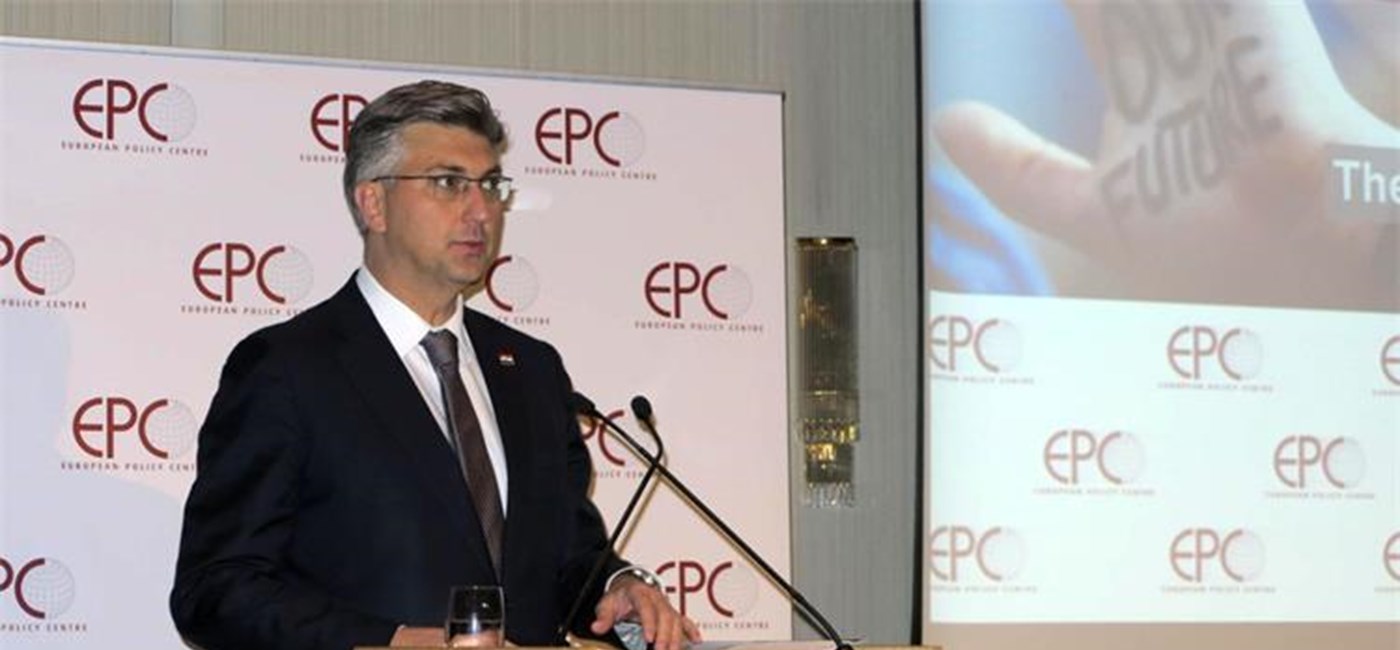All the challenges require more and not less Europe because none of them can be dealt with by one country alone, Plenkovic said in his address at a conference organised by Brussels-based think tank the European Policy Centre.
He presented a Croatian vision of EU development in the next institutional cycle from 2019 to 2024.
The conference took place two days before a very important summit of the leaders of 27 EU member states in the Romanian city of Sibiu, which will focus on Europe's future and on preparations for a new strategic agenda for the 2019-2024 period, and two weeks before elections for the European Parliament.
Plenkovic said that the existing challenges should be used as an opportunity to build a Europe of which its citizens and its children would be proud.
The European Union should try to be more agile and not fragile, work together and not separately, be open to the world and not introverted, the Croatian PM said.
He added that under "agile and not fragile" he meant an EU that will be able to anticipate key internal and external challenges and provide quick, effective and strong responses, and be equipped for dealing with citizens' needs and concerns. A Union that can guarantee internal security, effectively manage migration, preserve the European social model, intensify the single market, promote greener energy and better connectivity, a Union that expands and deepens the euro area, with a well-balanced budget that brings added value, he said.
Plenkovic said that people are afraid of terrorism, violent extremism, cross-border threats and organised crime, noting that no country can fully defend itself from that on its own. He recalled that Croatia has deployed over 6,500 police officers along the longest border with non-EU countries to prevent illegal migration via the Eastern Mediterranean route.
He said he firmly believes that the Schengen system must be fully functioning and must include Croatia, Romania and Bulgaria in accordance with the European Commission's evaluation.
Among the priorities Plenkovic cited reform of the common asylum system so that no member state would find itself in trouble because of its geographical position.
An agile European Union also means having adequate financial resources that will help eliminate the existing differences in development and ensure greater cohesion and convergence, the PM said.
For me the European Union is not the sum of its member states, but a Union in which they join their individual strengths into a joint power for the benefit of all. The strength of the EU stems from its diversity. It has become fashionable to speak about the disunity of the European Union and there is a perception of the EU being more divided than ever before, Plenkovic said, adding that the perceived divisions in east and west, north and south, new and old members, euro-area members and non-members, harm and weaken the Union.
Plenkovic briefly presented Croatia's journey to EU membership, whose fruits, he said, the country was beginning to reap.
He underlined the good economic results in the last two and a half years of his government's term, a GDP increase of between 2.5% and 3%, low inflation, a budget surplus in the last two years, employment growth, an increase in pensions, growth of investment and social benefits, tax breaks for citizens and businesses, and a decline in public debt and interest rates on debt.
The EU today operates in circumstances that are significantly different, in the wake of a major migrant crisis, Brexit, and a major increase in populism, demagogy and fake news, he said.
The EU's future will depend on how it will respond to a number of questions that require answers, such as whether it will be able to enhance the safety of its citizens and border protection, while at the same time protecting European values and freedom of movement; whether it will maintain the level of employment and income in the context of growing global competition and the fourth industrial revolution that brings automation, digitisation and artificial intelligence; whether it will increase economic inclusiveness, maintain affordable healthcare, reduce social and territorial inequalities; whether it will manage to increase its competitiveness on the global level and secure sustainable development and environmental protection, and whether it will find the inner strength to overcome differences and divisions and reach the necessary consensus to speak in one strong European voice, as expected of a global stakeholder and the world's second largest economy, said the Croatian PM.
He said that populism, whose growth was also due to new technologies and social network abuse, posed a serious threat to democracy.
Since democracy is not based on the opinion of the best informed but on the opinion of those who are more numerous, one of the most important challenges to democracy in the EU is how to make sure that all citizens form their opinion on the basis of verified and relevant information, said Plenkovic.
He advocated an EU open to the world, unafraid and self-confident, attractive, open and recognised by the world as setting high standards. The EU should be open to global trade, but based on rules that are the same for everyone, he said.
Plenkovic also said that EU enlargement must remain one of the strategic priorities and that it would be high on the agenda of Croatia's presidency of the Council of the EU in the first half of 2020.
Text: Hina



